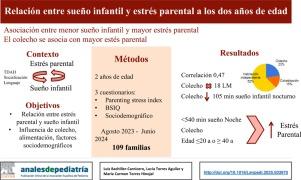Relación entre el sueño infantil, el estrés parental y el colecho a los 2 años de edad
IF 2.1
4区 医学
Q2 PEDIATRICS
引用次数: 0
Abstract
Introduction
Parental stress may contribute to neurodevelopmental disorders in children, and lack of sleep may be at the root of the issue. The aim of our study was to assess the association between infant sleep and parental stress, as well as the influence of socioeconomic factors or co-sleeping.
Material and methods
We conducted a prospective observational study in children aged 2 years. Parents completed 3 questionnaires: the Parenting Stress Index-4-Short Form (PSI-SF-4), the Brief Infant Sleep Questionnaire and a questionnaire that assessed socioeconomic and sleep-related variables.
Results
The sample included 109 families. The median (interquartile range) duration of nighttime sleep, time spent awake at night and sleep onset latency (in minutes) and number of nocturnal awakenings in the children were 500 (447.5-602.5), 15 (5-60), 1 (0-3) and 10 (8-20), respectively. The mean total score ± SD in the PSI-SF-4 was 61.1 ± 12.3. The correlation between the PSI-SF-4 total score and the minutes of nighttime sleep was: 0.478 (P = .001), and we found a significant increase in the PSI-SF-4 total score when nighttime sleep duration in the child was less than 540 min, mainly on account of the dysfunctional parent-child interaction and difficult child subscales. Parental stress was increased significantly with the practice of co-sleeping and with parental age less than 20 years or more than 40 years. Co-sleeping was associated with shorter nighttime sleepduration, more time awake at night and an increased number of nocturnal awakenings.
Conclusions
Decreased infant sleep duration at night caused an increase in parental stress. Likewise, co-sleeping and early or advanced parenthood are associated with a higher level of stress.

儿童睡眠、父母压力与2岁时腹泻的关系
父母的压力可能会导致儿童神经发育障碍,而睡眠不足可能是问题的根源。我们的研究目的是评估婴儿睡眠与父母压力之间的关系,以及社会经济因素或共睡的影响。材料和方法我们在2岁儿童中进行了一项前瞻性观察研究。家长们完成了3份问卷:父母压力指数-4短表(PSI-SF-4)、婴儿睡眠简短问卷和一份评估社会经济和睡眠相关变量的问卷。结果共纳入109个家庭。儿童夜间睡眠时间、夜间清醒时间、睡眠发作潜伏期(分钟)和夜间觉醒次数的中位数(四分位数范围)分别为500(447.5 ~ 602.5)、15(5 ~ 60)、1(0 ~ 3)和10(8 ~ 20)。PSI-SF-4的平均总分±SD为61.1±12.3分。PSI-SF-4总分与夜间睡眠时间的相关性为0.478 (P = 0.001),当儿童夜间睡眠时间小于540 min时,PSI-SF-4总分显著升高,主要是由于亲子互动功能障碍和困难儿童分量表。与父母同睡、父母年龄小于20岁或大于40岁时,父母压力显著增加。共睡与夜间睡眠时间较短、夜间清醒时间较多和夜间醒来次数增加有关。结论婴儿夜间睡眠时间的减少导致父母压力的增加。同样,与父母同睡、过早或提前为人父母也会带来更大的压力。
本文章由计算机程序翻译,如有差异,请以英文原文为准。
求助全文
约1分钟内获得全文
求助全文
来源期刊

Anales de pediatria
医学-小儿科
CiteScore
2.10
自引率
4.80%
发文量
155
审稿时长
44 days
期刊介绍:
La Asociación Española de Pediatría tiene como uno de sus objetivos principales la difusión de información científica rigurosa y actualizada sobre las distintas áreas de la pediatría. Anales de Pediatría es el Órgano de Expresión Científica de la Asociación y constituye el vehículo a través del cual se comunican los asociados. Publica trabajos originales sobre investigación clínica en pediatría procedentes de España y países latinoamericanos, así como artículos de revisión elaborados por los mejores profesionales de cada especialidad, las comunicaciones del congreso anual y los libros de actas de la Asociación, y guías de actuación elaboradas por las diferentes Sociedades/Secciones Especializadas integradas en la Asociación Española de Pediatría.
 求助内容:
求助内容: 应助结果提醒方式:
应助结果提醒方式:


